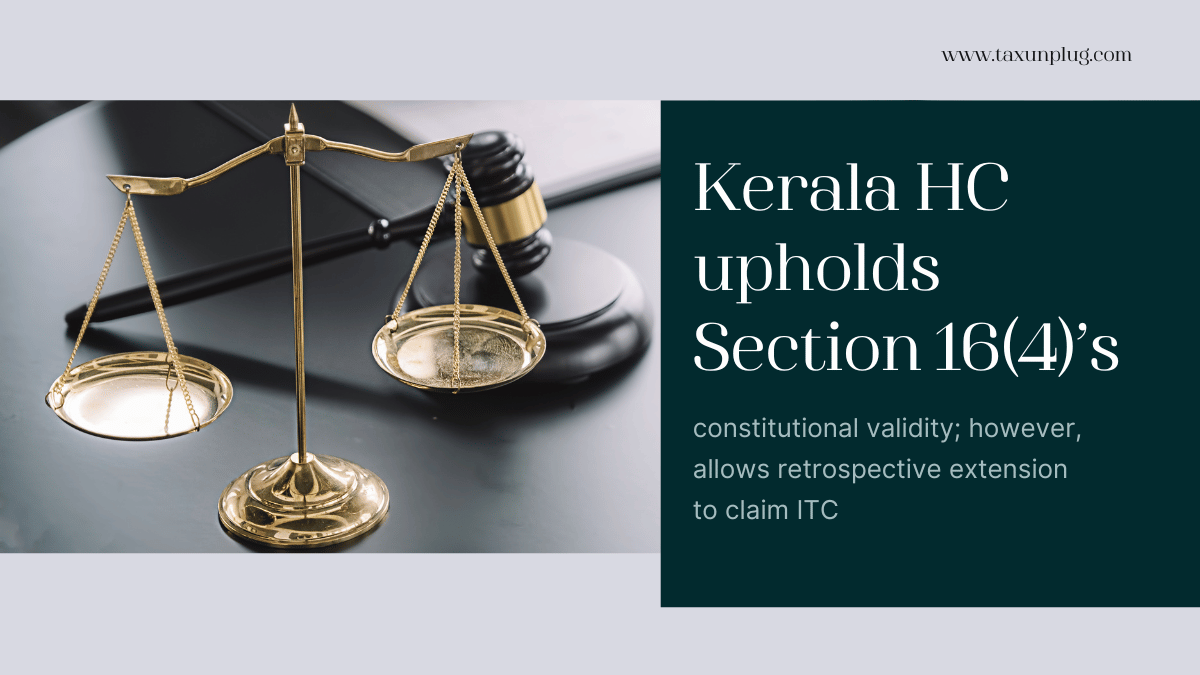Kerala HC upholds Section 16(4)’s constitutional validity
M. Trade Links vs Union of India [WP(C) No. 31559 of 2019]
The petitioners who were registered dealers under the provisions of the CGST Act and SGST Act, 2017 are not being allowed to claim input tax credit even though they have a valid tax invoice, evidence that they had paid the value of the goods and the applicable GST components to the relevant suppliers, and proof that they had received the goods. It is said that in certain instances, the relevant supplier has remitted the tax (GST), but for technical reasons it did not appear in their GSTR return.
On behalf of the respondents, it is submitted that under the GST laws, the tax collected must be assigned to the jurisdiction where the consumption takes place. Therefore, ITC passes through the state during inter-state supplies. If the inter-state supplier does not pay tax (SGST+CGST) and the inter-state supplier is allowed to take credit on his invoice, the originating State Government will have to transfer amounts it never received in the tax periods in a financial year to the destination States. This would cause damage to the state to the extent that the originating state would have to transfer the amount without receiving it, and this scenario would violate the entire tax system in the absence of Section 16(2)(c).
The Kerala High Court recognized the difficulties faced during the initial rollout of the GST system in the financial years 2017-2018 and 2018-2019. The government acknowledged these issues and issued Circulars No. 183/15/2022-GST and 193/05/2023-GST to address genuine claims and errors from that period. These circulars cover the period from the start of GST until Section 16(2)(aa) was introduced on January 1, 2022.
Recipients can claim Input Tax Credit (ITC) for valid scenarios listed in the circulars if they provide proof of payment to the government by the supplier. Petitioners who couldn’t benefit from these circulars within the prescribed time limit can approach the GST authority within 30 days to claim their benefits. The GST authorities will review and grant applicable relief to eligible dealers based on these circulars.
Before the 2022 amendment, the deadline for filing returns for September under Section 39 was September 30. The amendment extended this deadline to November 30 to ease initial compliance difficulties.
Therefore, if a dealer filed their return after September 30 but before November 30 from July 1, 2017, to November 30, 2022, their ITC claim should be processed if they are otherwise eligible. This procedural amendment is given retrospective effect due to the initial challenges in implementing GST. The challenge to the constitutional validity of Sections 16(2)(c) and 16(4) is rejected.
To Download official order, click here.
“The site is for information purposes only and does not provide legal advice of any sort. Viewing this site, receipt of information contained on this site, or the transmission of information from or to this site does not constitute an attorney-client relationship. The information on this site is not intended to be a substitute for professional advice.”

